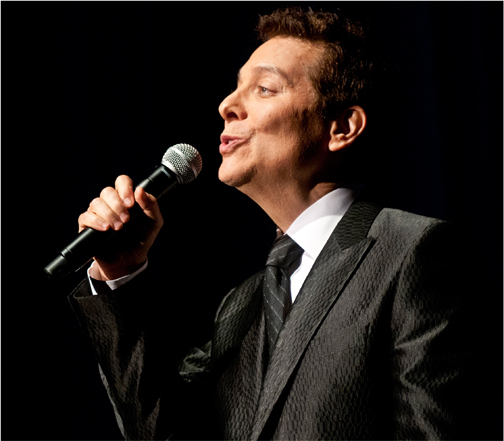By Robert D. Thomas
Music Critic
Pasadena Star-News/San Gabriel Valley Tribune/Whittier Daily News
A shorter version of this article was first published today in the above papers.
______________________
Pasadena Pops With Michael Feinstein
Saturday, July 19 • 7:30 p.m. (Gates open 5:30 p.m.)
Los Angeles County Arboretum; 301 North Baldwin Ave., Arcadia
Tickets: $20-$115
Information: www.pasadenasymphony-pops.org
______________________

Michael Feinstein will sing songs of the Gershwins — an integral part of “The Great American Songbook” — with the Pasadena Pops on Saturday, July 19, at the Los Angeles County Arboretum.
______________________
When Michael Feinstein steps onto the stage Saturday night at the Los Angeles County Arboretum, he will be in an unfamiliar role, at least for Pasadena Pops concerts. Rather than appearing as Principal Conductor (the orchestra’s Resident Conductor, Larry Blank, will be waving his baton, instead) Feinstein will spend the evening crooning music by George and Ira Gershwin, songs that are dear to his heart and an integral part of “The Great American Songbook” (LINK), a project on which Feinstein has focused his career and life for more than 20 years.
“I fell in love with the Gershwins’ music at a very early age,” said Feinstein in an interview recently, “and then had the opportunity of knowing and working with Ira Gershwin for six years. He taught me much of what I know about this music and how to perform it. This program will be an affectionate tribute to their collaboration, filled with anecdotes that are often humorous and illuminating.”
Feinstein has created some new arrangements for this concert; he will also include classic sets. “For example,” says Feinstein, “I will do one piece with lyrics by Ira and music by another composer, called Tchaikovsky. It was introduced by Danny Kaye and I perform it with Danny’s original orchestration. There will be a medley of songs that George put together for Fred Astaire that I have arranged. I perform different ‘chestnuts’ in different ways, with different styles. So this is a fresh look at this iconic music.”
Music of the Gershwins is a quintessential example of “The Great American Songbook,” believes Feinstein. ‘This is a body of work that began in the earlier part of the 20th century, crystalizing in the 1920s and continues today,” he explains. “It contains music and lyrics that transcend their time — they have a timeless quality that appeals to contemporary audiences.”
Feinstein isn’t the only person to work with this concept; three years ago Thomas Hampson traveled throughout the United State States and Europe performing recitals of music from this collection and as long ago as the 1950s Ella Fitzgerald was recording music by Rodgers and Hart that she termed a “song book.”
Nonetheless, “The Great American Songbook” is Feinstein’s passion. “There are a few songs from the early 1900s that survive — Stephen Foster and Victor Herbert, for example,” says Feinstein, “but the creations that began in the 1920s had a certain level of sophistication in the words, a clever turn of phrase, that not only has appeal today but continues to speak to the human condition. It is time that determines what lasts, not someone saying, ‘This is part of The Great American Songbook.”
Mining that collection produces consistently distinctive concerts for the Pasadena Pops (Feinstein is in his second year as the ensemble’s principal conductor). “Pasadena is an extension of my love for The Great American Songbook,” says Feinstein, “but the concerts a very different experience because it’s a symphony orchestra playing these arrangements. Often ‘pops’ concerts are dumbed-down arrangements of songs that are, for want of a better word, ‘schlocky,’ kind of generic and boring. Our programs are not elevator music; this is music of true harmonic substance, played by a great orchestra.
“Moreover,” he continues, “this is often ‘new music’ for the musicians. ‘Pops’ orchestras traditionally play certain pieces of music but there’s very little that the Pasadena Pops Orchestra is accustomed to in our concerts. That keeps things fresh. Things like Saturday’s Gershwin concert are fun for me and for the musicians, as well. I want to create programs that I would enjoy attending.”
For more on Michael Feinstein on “The Great American Songbook,” click HERE.
_______________________
(c) Copyright 2014, Robert D. Thomas. All rights reserved. Portions may be quoted with attribution.

